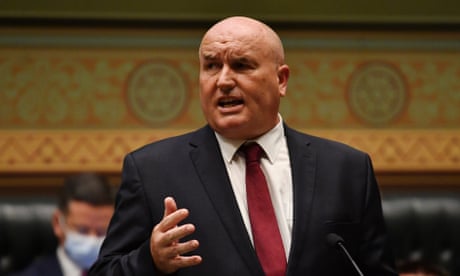- by foxnews
- 08 Apr 2025
Five key questions about the Sydney train network fiasco
Five key questions about the Sydney train network fiasco
- by theguardian
- 24 Feb 2022
- in news

While the New South Wales premier, Dominic Perrottet, insisted on Wednesday that he still had confidence in Elliott, he rebuked his failure to tell members of the government of the looming crisis and for the decision to go to bed while the department scrambled to resolve industrial action taken by the Rail, Tram and Bus Union (RTBU).
Substantial gaps and contradictions remain in the timeline leading up to the decision to close the network.
Transport for NSW has refused to answer questions about when the minister was briefed, and Elliott has at times offered contradictory statements about when he was informed.
The Guardian has attempted to summarise the key questions raised this week, and what we know about the situation to date.
The events leading up to the decision to close the network have become a matter of contention, and Elliott has offered different versions of what occurred.
At a press conference on Tuesday, Elliott said that he had gone to bed between 11pm and 12am on Sunday night, and had not been aware of the looming shutdown when he went to sleep.
It was certainly after 11pm that he went to sleep, because at 11.10pm he posted a photo to his personal Facebook account of NSW police officers attending a Sydney Gay and Lesbian Mardi Gras event.
As Elliott slept, the transport department continued to scramble.
While Elliott has denied being aware of the shutdown, he has insisted he would have followed departmental advice that running the rail network under conditions imposed by the RTBU would be unsafe.
He has said the key decision-maker was the Sydney Trains chief executive, Matt Longland, who reportedly made the decision to close the network at 12.43am.
Crucially, under NSW law transport officials are required to inform the minister before any significant developments in relation to the transit network, and the government is now investigating whether that notification occurred.
The union flagged a series of planned industrial actions including a ban on overtime, changes to master rosters and altered working conditions.
The RTBU secretary, Alex Claassens, told the Guardian negotiations in the commission began on Saturday morning.
At the same time, Elliott was in Darwin in his capacity as veterans affairs minister. On Saturday he posted a photo to his personal Facebook account drinking a beer with the prime minister, Scott Morrison.
The exact wording of the agreement reached on Saturday was not released, but both parties have offered differing versions of what followed.
What is known is that by Sunday evening, the government had decided to return to the commission.
The government accused the union of going back on the terms of the Saturday deal.
The sticking point appeared to be a disagreement over which rosters would be used as the basis of the industrial action. In any case, the failure to reach a new agreement prompted a flurry of action within the transport department.
In the meantime, Elliott attended events commemorating the 80th anniversary of the Darwin bombing at about 11am eastern time and returned to Sydney later on Sunday afternoon.
His office did not respond to questions about when he landed.
It remains unclear.
But he also revealed that he has launched an investigation into the events leading up to the shutdown, and in particular whether the department adequately informed the minister of the decision.
That investigation may be able to answer outstanding questions about what the minister was told and when, although Perrottet has now instructed that briefs on major interruptions to the rail service must be made in writing, suggesting there may have been a series of verbal conversations in the lead up to the shutdown.
On Tuesday, Elliott revealed the government had withdrawn its case against the RTBU in the fair work commission and said he had met with union officials in the hope of a speedier return to full services.
But by Wednesday afternoon the network was still running limited services, and the union suggested it was unlikely that it would end its industrial action until Monday.
- by foxnews
- descember 09, 2016
Ancient settlement reveals remains of 1,800-year-old dog, baffling experts: 'Preserved quite well'
Archaeologists have recently unearthed the remarkably well-preserved remains of a dog from ancient Rome, shedding light on the widespread practice of ritual sacrifice in antiquity.
read more


